 Refutations
Refutations
 The Mawlid
The Mawlid
|
The Baatinee Ismaa'eelee Ubaydiyyah (Alleged Fatimids) of Egypt Innovated the Celebration of the Mawlid
Posted by Abu.Iyaad, Editor in The Mawlid Topics: Fatimids • Al-Mawlid Al-Nabawi |

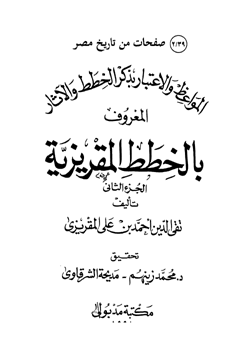 A common misconception is that celebration of the mawlid was first done by the ruler of Irbil (in Iraq) Mudhaffar al-Din bin Zayn al-Din with the assistance of Umar bin Dihya in the early 7th century (after 604H). This is found mentioned in the history books and is found in Ibn Kathir's al-Bidayah wal-Nihayah. Many of those who write on the mawlid whether those against it and those for it (such as al-Suyuti) have relied upon this matter when writing about the origins of the mawlid.
A common misconception is that celebration of the mawlid was first done by the ruler of Irbil (in Iraq) Mudhaffar al-Din bin Zayn al-Din with the assistance of Umar bin Dihya in the early 7th century (after 604H). This is found mentioned in the history books and is found in Ibn Kathir's al-Bidayah wal-Nihayah. Many of those who write on the mawlid whether those against it and those for it (such as al-Suyuti) have relied upon this matter when writing about the origins of the mawlid.
However, the truth is that Mudhaffar al-Din was not the first to practice or innovate this. Rather, it was the heretical Baatinee Ismaa'eelee Ubaydis of Egypt (pretending to be from the offspring of Fatimah). This is clearly mentioned in the history books and is a matter of historical record.
But before we document this, we should point out most importantly that the Egyptian Copts were the likely influence upon the Ismaa'eelee Baatinee heretics in this particular matter because as we shall see from al-Maqrizi in his historical account, the Egyptian Copts used to celebrate the (alleged) birthday of Eesaa (alayhis salaam) on the 29th of the fourth month of their calendar which corresponds to between 10th December and 8th January in the Georgian calendar.
Al-Maqrizi on the Egyptian Copts Celebrating Birthday of Eesaa (alayhis salaam)
Al-Maqrizi (d. 845H) writes in al-Khitat (Maktabah Madbuli, Cairo, 1st edition, 1997CE, 2/359):
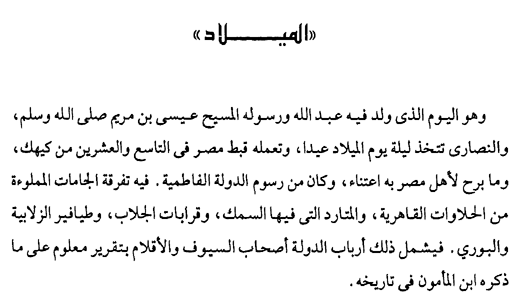
The Meelaad
This is the day on which the slave of Allaah and His messenger, Eesaa bin Maryam (sallallaahu alayhi wasallam) was born, and the Christians take the night of the birthday as a day of celebration (eed). The Copts also practice it in Egypt on 29th of Kayhik [4th month of their calendar] and the people of Egypt have never ceased to be occupied with it, and it was from the ceremonies of Fatimid state...
Al-Maqrizi on the Baatinee Ismaa'eel Fatimids Celebrating Birthdays
Al-Maqrizi writes (2/347):
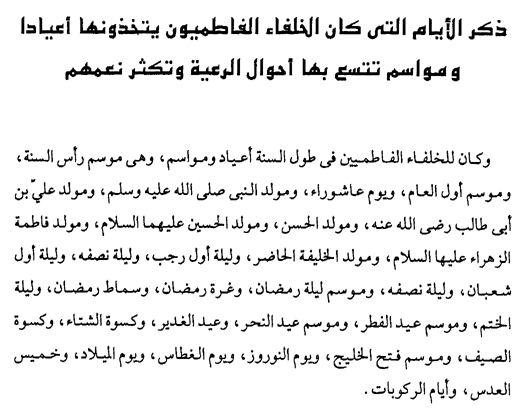
A mention of the days which the Fatimid rulers Used to Take as Days of Celebration and Seasons in Which the Subjects Are Given Increase and Showered With Favours
And the Fatimid rulers (khulafaa) used to have days of celebration and festive seasons throughout the year and they are: the season of the year's peak, the season of the year's beginning, the Day of Ashura, the mawlid (birthday) of the Prophet (sallallaahu alayhi wasallam), the birthday of Ali bin Abi Talib (radiallaahu anhu), the birthday of al-Hasan and the birthday of al-Husayn (alayhimaa as-salaam), the birthday of Fatimah al-Zahraa (alayhaa as-salaam), the birthday of the current ruler, the night of the first of Rajab and its middle (the fifteenth), and the night of the first of Sha'baan and its middle...
Al-Qalqashandi on the Ubaydi Batinis and the mawlid
Shihab al-Din al-Qalqashandi another historian of Egypt writes in his work Subh al-A'shaa (3/5202-503), and in this entire section al-Qalqashandi is documenting all of the various gatherings and sittings that would take place and on what occasions and ceremonies the ruler would sit down for:
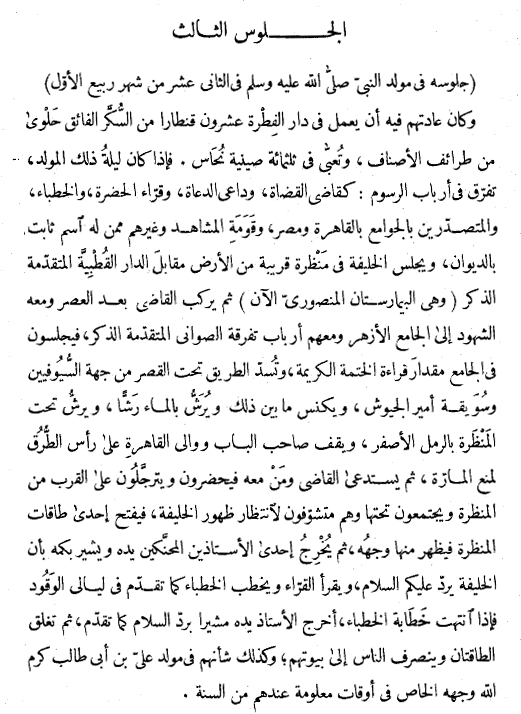
The Third Sitting
His (the Ruler's) Sitting During the Prophet's Birthday (sallallaahu alayhi wasallam) on the 12th of the Month of Rabi' al-Awwal.
We won't translate all of it, but he goes on to mention the various things (ceremonies, speeches, festivities) that would take place on that day, and at the very end he says:
And likewise was their affair regarding the birthday of Ali bin Abi Talib (may Allaah ennoble his face) specifically, in the times known to them during the year.
Shaykh Muhammad bin Bakheet al-Mutee'ee on The Baatinee Ismaa'eelees and the innovation of the mawlid
Al-Mutee'ee (d. 1354H) is a former muftee of Egypt and he has a book called (أحسن الكلام فيما يتعلق بالسنة والبدعة من الأحكام), and he simply follows the way of the likes of al-Izz bin Abd al-Salam and al-Nawawi in explaining bidah upon its linguistic definition and thus entering it into the five rulings (wajib, mandub, mubah, makruh, haram). However, as we have mentioned elsewhere, there is a unanimous consensus amongst all Muslim scholars that celebration of the mawlid is indeed an innovation not known to the Companions or the Salaf. This is not even under dispute. The dispute is as to whether this practice is acceptable in Islam, after agreement that it is indeed a bidah (innovation).
We are going to quote from al-Mutee'ee to further corroborate that the Baatinee Ismaa'eelee Ubaydi heretics of fourth century Egypt were the innovators of this practice, whilst noting that al-Mutee'ee himself supports the mawlid.
Al-Mutee'ee wrote (1329H print,Jamaaliyyah, Egypt, pp. 59-60):
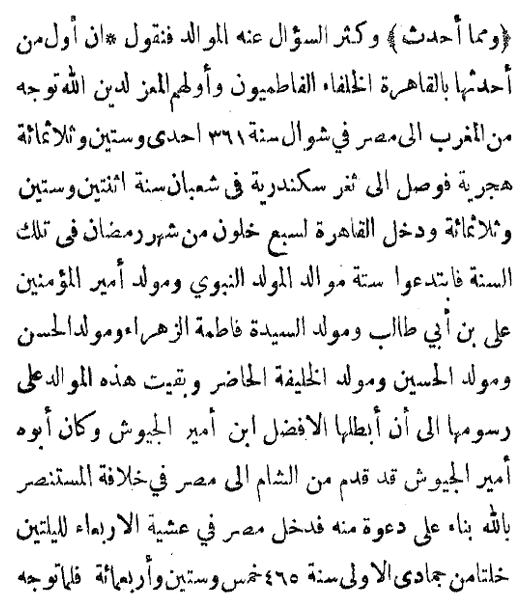
And from that which has been invented (newly-introduced) and about which questions have increased are the birthdays (mawaalid). So we say: The first to introduce them in Cairo, were the Fatimid rulers, and the first of them was al-Mu'izz Li Dinillah, he advanced from al-Maghrib (Morocco) to Egypt in Shawwaal of 361H, and reached the port of Alexandria in Sha'baan of 362H. He entered Cairo with seven [days] remaining of the month of Ramadan in that year. They then innovated six birthday (celebrations): The Prophet's birthday, the birthday of the chief of the believers, Ali bin Abi Talib, the birthday of Sayyidah Faatimah al-Zahraa, the birthday of al-Hasan and the birthday of al-Husayn and the birthday of the presently serving ruler. These birthday (celebrations) remained as customs until they were invalidated by al-Afdal, son of the chief of armies whose father was the chief of armies and had come from Shaam to Egypt during the rulership of al-Mustansir Billah upon his invitation to him. So he entered Egypt on the evening of Wednesday with two days remaining from Jumadah al-Ulaa in 465H...
Shaykh Ali Mahfuz of Egypt on the Baatinee Ismaa'eelee Origins of the mawlid
Shaykh Ali Mahfuz (d. 1361H) was one of the major scholars of Egypt, of al-Azhar and he writes in his book (الإبداع في مضار الابتداع) (Maktabah al-Rushd, 1421H, p.231):
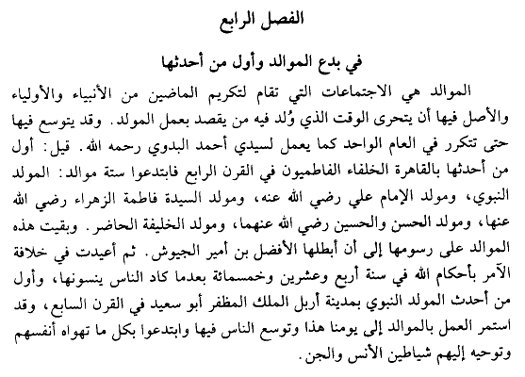
The Fourth Chapter. Regarding the Birthday Celebrations and the First to Introduce Them
... It is said that the first to introduce them in Cairo where the Fatimid rulers in the fourth century and they innovated six birthday celebrations: The Prophet's birthday, the birthday of Imaam Ali bin Abi Talib (radiallaahu anhu), the birthday of Sayyidah Faatimah al-Zahraa (radiallaahu anhaa), the birthday of al-Hasan and al-Husayn (radiallaahu anhumaa) and the birthday of the presently serving ruler. These birthday (celebrations) remained as customs until they were invalidated by al-Afdal, son of the chief of armies. Then they were brought back in the rulership of al-Aamir bi Ahkaamillaah in 524H after the people had forgotten them. The first to introduce the mawlid nabawiyy in the city of Irbil was the king, Mudhaffar Abu Sa'eed in the seventh century, and the practice of the mawlid has continued to this day of ours. The people have taken liberties regarding it and have innovated everything their souls have desired and which the devils from men and jinn have inspired to them.
Summary
All scholars are agreed that the mawlid is a bidah in the deen of Islaam, there is no dispute about that, not even between those who speak in its favour. There is also no dispute that the first to innovate this into Islam were the disbelieving, heretical Baatinee Ismaa'eelee Ubaydees who established their state in Egypt. They innovated these matters into the religion in order to pull the Muslims away from the actual symbols and rituals of Islam and make them preoccupied with other affairs and to give them an appealing alternative from the sharaa'i (legislated acts of worship and obedience in the Shariah), so they innovated birthday celebrations for the Ahl al-Bayt, and this was simply a means to call to their way, which is Ismaa'eelee Shi'ism (which is simply a cover for the disbelief they concealed). As we shall see in the next article inshaa'Allaah, the origins of these Baatinee Ismaa'eelees lie in a Persian Jew of Magian influence.And as for the mawlid itself and the arguments adduced for it, there is no one, not Ibn Hajar, not al-Suyuti (may Allaah have mercy upon them) nor anyone else from the latecomers who are more pious, knowledgeable and jealous for the deen of Allaah, and more loving of the Messenger (alayhis salaam) than Abu Bakr, Umar, Uthmaan, Alee, the Muhajireen, the Ansaar and the generality of the Sahabah, and the Tab'ieen and the four Imaams and the generality of the Salaf, such that their statements supporting the mawlid should be given a higher footing than the practical example and action of Abu Bakr, Umar's, Uthman, Ali, the Muhajireen (etc. etc. etc.) in abandoning the celebration of the Prophet's birthday despite the absence of anything preventing them from doing it and the presence of factors inviting them to do it. So whoever argued by way of the mistaken speech of al-Suyuti and Ibn Hajar and others is claiming that these later scholars are better guided, more erudite, and more loving of the Messenger than than Abu Bakr and Umar (etc. etc. etc.) and that they identified such goodness that Abu Bakr and Umar (etc. etc. etc.) were unable to identify as being good for the Muslims in their religion. Alongside our knowledge that the Messenger (sallallaahu alayhi wasallam) said in his farewell sermon, "Whoever amongst you lives for long will see many controversies, so you must stick to my Sunnah and the Sunnah of my rightly guided caliphs, bite onto it with your molars... and beware of the newly-invented matters, for every newly-invented matter is an innovation and all innovation is misguidance...", so we wonder with these people, is the Sunnah of the rightly-guided caliphs more worthy of being adhered to or the bid'ah initiated by the disbelieving Baatinee Ismaa'eelees (whose roots lie in a Persian Jew) through the argument that some later scholars in the 8th and 9th centuries deemed it to be something good simply because it was being practiced in their time?!!
Link to this article: Show: HTML Link • Full Link • Short Link
Share or Bookmark this page: You will need to have an account with the selected service in order to post links or bookmark this page.





|
Related Articles:
Add a Comment
You must be registered and logged in to comment.
| Key Topics | |
| al-fakihani • al-izz bin abd al-salam • al-masalih al-mursalah • al-maslahah al-mursalah • al-mawlid al-nabawi • al-mawlid-al-nabawi • al-nawawi • al-shaatibee • al-shafi'i • al-shatibi • baatiniyyah • bidah haqiqiyyah • bidah hasanah • bidah idafiyyah • fatimids • funerals • good innovation • hajj • ibn hajar • mawlid • misbahah • mother's day • niyaahah • niyyah • prayer • public interest • qur'an • rosary beads • shaking hands • shiah • sunnah hasanah • tabarruk • talbiyyah • tasbeeh beads • ubaydiyyah • | |



